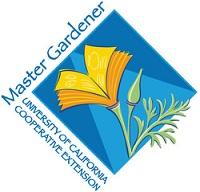
Become a Master Gardener
Applications for the 2024 Training Class are closed. Save the date for the 2026 class applications, which will be available June of 2025.
If you are committed to sharing and teaching information to others, the Master Gardeners of Sonoma County offer you the opportunity to learn and to use your knowledge of gardening to serve the community.
The UC Master Gardener Program is a volunteer organization that is dedicated to providing environmentally sustainable, science-based horticultural education to Sonoma County home gardeners. Master Gardeners of Sonoma County have a deep commitment to community service and are willing to volunteer as agents of the University of California Cooperative Extension (UCCE). We strongly encourage BIPOC (Black, Indigenous, and people of color) applicants. We aim to have a volunteer force as diverse as the residents of Sonoma County.
FAQs about the UC Master Gardener Program
What is the Master Gardener Program?
The UC Master Gardener program is certified by the University of California Cooperative Extension in the areas of home gardening and horticulture. Since 1982, the UC Master Gardener program has been training volunteers to provide science-based horticultural information to residential gardeners in Sonoma County.
Who becomes a Master Gardener?
Master Gardeners are people of all ages and from all walks of life and represent communities and neighborhoods throughout the county. Although some knowledge of plants and gardening is an asset, successful Master Gardeners are people willing to learn, willing to volunteer, and willing to be involved. Master Gardeners are well trained and enthusiastic individuals capable of imparting their knowledge to diverse groups of people in a wide range of community settings.
What training do Master Gardeners receive?
Master Gardener trainees participate in a training program comprised of instruction in plant science and sustainable horticulture covering such topics as soils, fertilizers, irrigation, weeds, diseases, insects and other pests, fruit and landscape trees, vegetables, xeriscaping, firewise landscaping and more. Each trainee receives The California Master Gardener Handbook, as well as other UCCE publications. Trainings are conducted in English. Classes are taught by experts in their fields including Cooperative Extension Advisors and specialists from the University of California, local community college faculty, and other knowledgeable resource people.
What is the Master Gardener’s commitment to the program?
After completing the training and passing a written exam, First-Year Master Gardeners are required to complete a minimum of 50 hours of volunteer service their first year. Master Gardener trainees are selected on the basis of their ability to fulfill this commitment and their willingness to participate in ongoing community outreach and training programs. In order to retain the title of Master Gardener in ensuing years, Master Gardeners must complete 12 hours of continuing education per year and perform 25 hours of volunteer service per year. Active Master Gardeners generally volunteer considerably more than the required minimum number of hours.
How do Master Gardeners earn volunteer hours?
- Answer inquiries from the public at our UCCE Information Desk, and staff information tables at community fairs and farmers’ markets
- Provide consultation and education events at community gardens and school gardens
- Develop curriculum and/or teach workshops
- Manage social media platforms for community and educational outreach
- Write articles for internal communications and community publications
- Assist with various committees that run our organization’s programs
- Design and maintain MG approved demonstration gardens
What kinds of things are NOT eligible for MG volunteer hours?
- Physical labor (such as digging, weeding, etc.) generally does not count as volunteer hours except in certain rare assignments pre-approved by the MG staff.
- Starting a garden club, or a local chapter of a gardening organization.
- Any work with a for-profit company.
- Advising commercial gardeners (any person or agency that is selling what they grow or selling their gardening services).
Can I add a “Master Gardener” reference to my business card?
The title “Master Gardener,” as well as the UCCE Master Gardener Program name badge, may be used only by appointed Master Gardener volunteers and only when they are in the course and scope of their UCCE Master Gardener volunteer activities. The title may not be used for commercial purposes. However, the training, experience, and certification gained by individuals in the UCCE Master Gardener Program may be referenced as personal qualifications, for example, when seeking employment.
What is the Cooperative Extension?
The University of California Cooperative Extension is part of a nationwide program established by an act of Congress in 1914 as part of the Land Grant University in every state. Three levels of government participate in funding Cooperative Extension programs: federal (through the USDA) provides a portion of the budget; state (through the universities) pays for statewide programs; and, county provides housing and operating expenses for local Cooperative Extension offices. The University of California Cooperative Extension works in cooperation with federal and county governments to provide local educational programs throughout California.
The mission of the University of California Cooperative Extension is to develop, extend, and bring about the use of research-based knowledge to improve specific practices and technologies. In addition, Cooperative Extension makes practical information generally available. Cooperative Extension has research support and organizational capacity in agriculture and natural resources, in family and consumer science, in community resource development, and in youth development.
University of California county staff (Advisors) are located in county Cooperative Extension offices in nearly every county in California. County Advisors extend knowledge, conduct field research, and provide leadership in selected Cooperative Extension program areas.
September 2023







